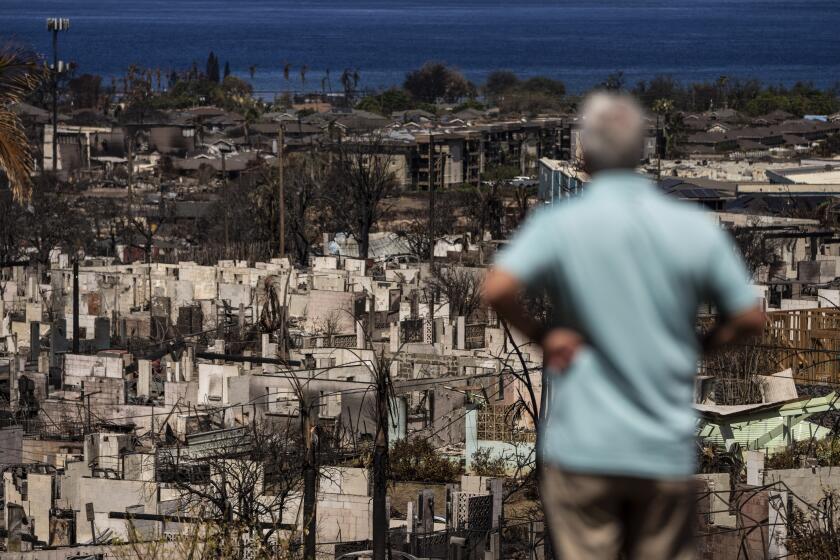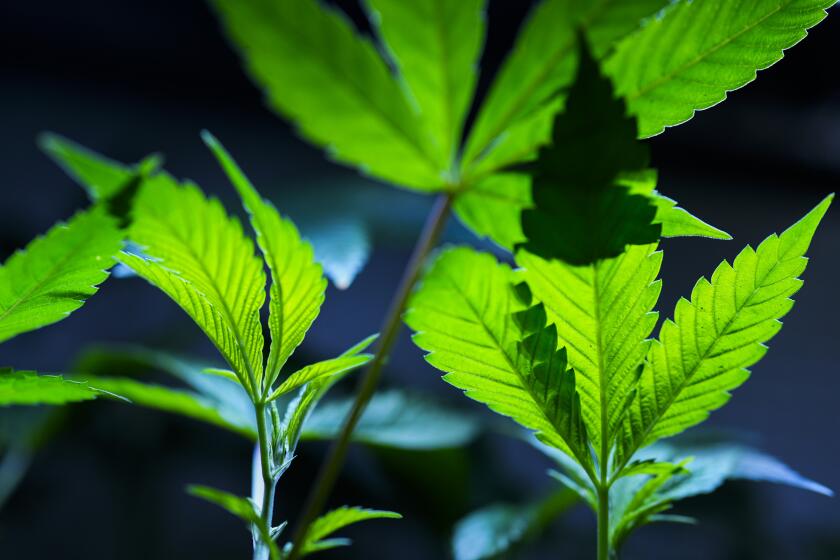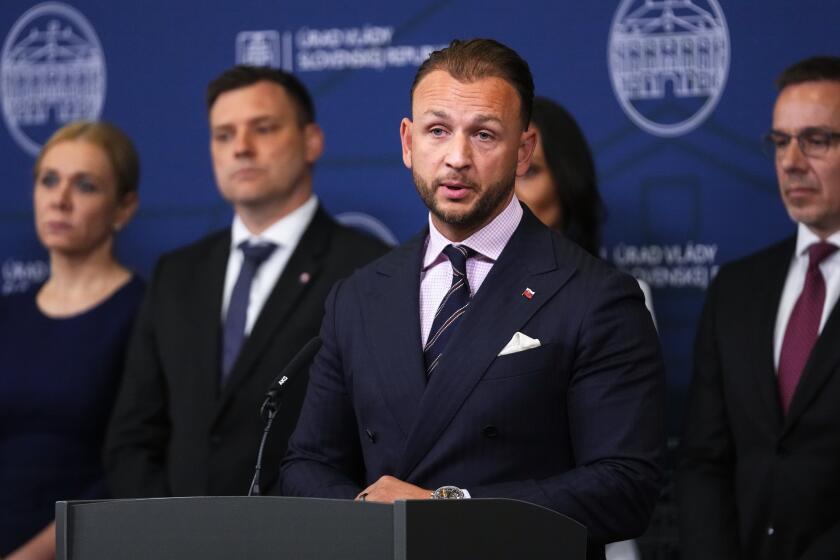Embittered Hebron Residents Conduct a Dialogue of the Deaf
Saiteer Salhab peered out from the second-story balcony of the house where he was born and, as a Palestinian, has been locked under Israeli curfew for the last six days. He watched the buses of Jewish tourists speed down the block to the Cave of the Patriarchs for the Sukkot holiday.
Sipping tea as Israeli soldiers patrolled the street below on Tuesday, Salhab dismissed the idea that a Washington summit between Israeli Prime Minister Benjamin Netanyahu and Palestinian Authority President Yasser Arafat would lead to a quick redeployment of Jewish soldiers from his city and the arrival of Palestinian police.
“It will just be a lie that will come down on us,” Salhab said bitterly as the Muslim call to prayer rang out. “It’s all talk, talk, talk.”
At the cave that is believed to be the burial site of the biblical patriarchs Abraham, Isaac and Jacob, Hebron Jewish leader David Wilder guided a tour of religious New Yorkers past army jeeps and metal detectors into the holy site for Muslims and Jews.
“This is a Jewish city,” Wilder said. “Hebron is not for sale. . . . Netanyahu is not going to allow a foreign armed body to sit on the hilltops overlooking us.”
Thus, as talks to save the peace process began in Washington--with Hebron as the centerpiece on the bargaining table--Israelis and Palestinians in this disputed city continued their dialogue of the deaf.
Neither side was prepared to budge from its long-held position that Hebron is its alone.
Each, as proof of the evil of the other, pointed to massacres: scores of Jews in 1929, when Arabs reacted to rumors of a Jewish attack against Arabs in Jerusalem, and Palestinians in 1990, when Israeli police shot and killed 18 Palestinians and in 1994, when a Jewish settler killed about 30 Muslim worshipers in a mosque.
At midday, the ancient city under siege looked to be still 3,000 years from a peaceful solution. Hebron was on a war footing.
Palestinian stores were ordered shut for all but a few hours in the early morning. Palestinians were told to stay in their houses while Jews arrived to pray. The central Arab market was abandoned to stray cats and battling graffiti: “Hamas everywhere,” read one swath in blue paint. Next to it a Jewish star and menorah were painted on the wall with a message from an Israeli army unit--”Golani with Hebron.”
Many streets were deserted, except for army outposts and Palestinian barricades of boulders, metal doors and trash barrels. Occasionally, groups of young men darted out from hiding with fixed jaws and jagged rocks to pummel cars with yellow Israeli license plates.
Israeli soldiers--whom the Palestinians insist should have been redeployed from here sooner, as earlier agreed under the Israeli-Palestinian peace accords--operated barbed-wire checkpoints with rifles at the ready. They had standing orders to fire at any Palestinian who approached an outpost.
Asked if the situation was calm, one soldier said: “You know, for me, it’s ugly. . . . I’d rather be home.”
But for Wilder and the 450 or so Jews who live under army guard among about 100,000 Palestinians, Hebron is home.
The Jewish King David’s capital was Hebron before he moved it to Jerusalem, they note.
“This is the heart of the Jewish people. We have been here for 3,700 years, and we can’t leave the tombs of our patriarchs to foreigners,” Wilder said. “We will never leave here.”
As he spoke, Jewish families, as part of a commemoration of the time that the Jews spent wandering the desert during the Exodus, ate their lunches in colorfully decorated sukkot. These are palm-thatched huts that recall the shacks Israelites lived in as they fled from slavery in Egypt.
Ofra Aviad and her mother, Miriam, explained from their sukkah that last week’s Palestinian uprising--which left 74 Palestinians and Jews dead and more than 1,000 injured--is proof that the Palestinians cannot be trusted to make peace or keep it.
Israelis like the Aviads repeatedly have pointed out that Hebron was the only West Bank city where Palestinians did not revolt; they believe that this is because Israeli soldiers, not Palestinian police, were here.
But Palestinians here say they did not fight the Israelis this time because they were under lock and key.
The lesson for Israelis in Hebron--who support the stance taken by Netanyahu, that security is an overriding concern and that Israel is justified in its position on the Hebron redeployment--is that Israel’s soldiers must stay for now.
“Security is our life. Throughout history our security has been in other people’s hands, and we don’t want that again,” said Ofra Aviad, 25.
She said Palestinians also felt safe with Israeli soldiers in Hebron and insisted: “They don’t want to see them go either.”
Asked why the Palestinians rose up in anger last week, Aviad’s mother replied: “Maybe they are not happy with what’s happening. I don’t know why.”
In the unlikely event the Aviads were ever to meet him, Aliman Qawasmeh, a Palestinian police lieutenant who resides in Hebron but works elsewhere, would explain his people’s unhappiness.
Sitting on a cement stoop by his family’s front door, he complained that Israeli soldiers recently had beaten Palestinians and conducted house-to-house searches, just as in the days of the seven-year intifada, the Palestinian uprising against Israeli occupation.
“We have not seen any progress. On the contrary, things are going backward,” he said. “Who doesn’t want peace? But Netanyahu wants peace for peace and you can’t do it that way. We want peace with our land and our rights.”
Israelis focus their anger over last week’s conflict on violations of the peace by the Palestinian police. The Israelis say the Palestinians broke a premise of the Israeli-Palestinian accord by shooting at Israeli soldiers. The Palestinian force was allowed to be armed under the bilateral accords.
Palestinian anger, though, centers on Israeli snipers firing on Palestinian civilians, aiming to kill. Many of the victims died of head and chest wounds.
Qawasmeh, 24, comes from a large Hebron clan. He said he spent six years in an Israeli jail during the intifada and joined the Palestinian security forces after the signing of the peace accords.
Now, he said, he is waiting with all Palestinians to see if the Washington talks produce real advances--a date for Hebron redeployment and a lifting of the military closure throughout the West Bank and Gaza Strip.
“We are waiting for palpable results in the streets,” he said.
And if they are not forthcoming? “We are going to defend our land and our people,” he said. “There is going to be an intifada again, but this time it won’t be an intifada of stones.”
More to Read
Start your day right
Sign up for Essential California for news, features and recommendations from the L.A. Times and beyond in your inbox six days a week.
You may occasionally receive promotional content from the Los Angeles Times.






